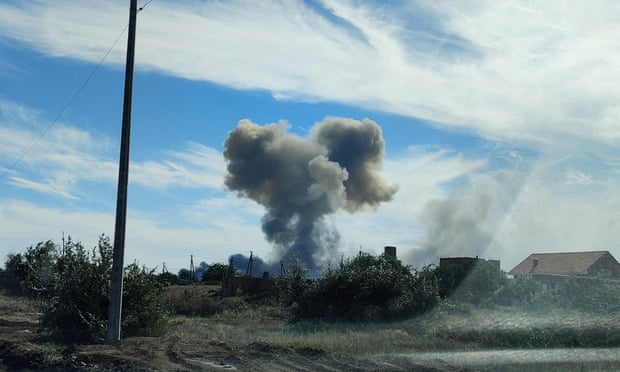Russia-Ukraine war at a glance
Russia-Ukraine war: what we know on day 168 of the invasion
Zelenskiy vows to ‘liberate’ Crimea as Kyiv denies responsibility for deadly attack on Russian airbase in the annexed peninsula

A Russian airbase deep behind the frontline in Crimea has been damaged by several large explosions, killing at least one person. It was not immediately clear whether it had been targeted by a long-range Ukrainian missile strike. In his nightly address, Ukraine’s president, Volodymyr Zelenskiy, did not discuss who was behind the attacks but vowed to “liberate” Crimea, saying: “This Russian war against Ukraine and against the entire free Europe began with Crimea and must end with Crimea – with its liberation.” An adviser to the president, Mikhail Podolyak, said Ukraine was not taking responsibility for the explosions, suggesting partisans might have been involved.
The head of Ukraine’s state nuclear power firm warned of the “very high” risks from shelling at the Zaporizhzhia nuclear power plant in the Russian-occupied south and said it was vital Kyiv regains control over the facility in time for winter. Energoatom’s chief, Petro Kotin, told Reuters in an interview that last week’s Russian shelling had damaged three lines that connect the Zaporizhzhia plant to the Ukrainian grid and that Russiawanted to connect the facility to its grid.
Russian forces occupying the Zaporizhzhia nuclear plant are reorienting the plant’s electricity production to connect to Crimea, annexed by Moscow in 2014, according to Ukrainian operator Energoatom. “To do this, you must first damage the power lines of the plant connected to the Ukrainian energy system. From August 7 to 9, the Russians have already damaged three power lines. At the moment, the plant is operating with only one production line, which is an extremely dangerous way of working,” Energoatom president Petro Kotin told Ukrainian television. The plant, located not far from the Crimean peninsula, has six of Ukraine’s 15 reactors, and is capable of supplying power for four million homes.
The leaders of Estonia and Finland want fellow European countries to stop issuing tourist visas to Russian citizens, saying they should not be able to take holidays in Europe while the Russian government carries out a war in Ukraine. The Estonian prime minister, Kaja Kallas, wrote on Tuesday on Twitter that “visiting Europe is a privilege, not a human right” and that it was “time to end tourism from Russia now”, the Associated Press reported.
US president Joe Biden on Tuesday signed documents endorsing Finland and Sweden’s accession to Nato, the most significant expansion of the military alliance since the 1990s as it responds to Russia’s invasion of Ukraine, Reuters reports.
The US state department has approved $89m worth of assistance to help Ukraine equip and train 100 teams to clear landmines and unexploded ordnance for a year, Reuters reported.
The total number of grain-carrying ships to leave Ukrainian ports under a UN brokered deal to ease the global food crisis has now reached 12, with the two latest ships which left on Tuesday headed for Istanbul and Turkey.
Russia’s Baltic exclave of Kaliningrad has been struggling with quotas imposed by the EU for sanctioned goods that it can import across Lithuania from mainland Russia or Belarus, the region’s governor admitted.Lithuania infuriated Moscow in June by banning the land transit of goods such as concrete and steel to Kaliningrad after EU sanctions on them came into force, Reuters reported.
Russia has launched an Iranian satellite from Kazakhstan amid concerns it could be used for battlefield surveillance in Moscow’s invasion of Ukraine. Iran has denied that the Khayyam satellite, which was delivered into orbit onboard a Soyuz rocket launched from Baikonur cosmodrome, would ever be under Russian control. But the Washington Post previously reported that Moscow told Tehran it “plans to use the satellite for several months, or longer, to enhance its surveillance of military targets” in Ukraine, according to two US officials.
I write from Ukraine, where I've spent much of the past six months, reporting on the build-up to the conflict and the grim reality of war. It has been the most intense time of my 30-year career. In December I visited the trenches outside Donetsk with the Ukrainian army; in January I went to Mariupol and drove along the coast to Crimea; on 24 February I was with other colleagues in the Ukrainian capital as the first Russian bombs fell.
This is the biggest war in Europe since 1945. It is, for Ukrainians, an existential struggle against a new but familiar Russian imperialism. Our team of reporters and editors intend to cover this war for as long as it lasts, however expensive that may prove to be. We are committed to telling the human stories of those caught up in war, as well as the international dimension. But we can't do this without the support of Guardian readers. It is your passion, engagement and financial contributions which underpin our independent journalism and make it possible for us to report from places like Ukraine.
If you are able to help with a monthly or single contribution it will boost our resources and enhance our ability to report the truth about what is happening in this terrible conflict.
Thank you.
Luke Harding
Foreign correspondent


Nenhum comentário:
Postar um comentário